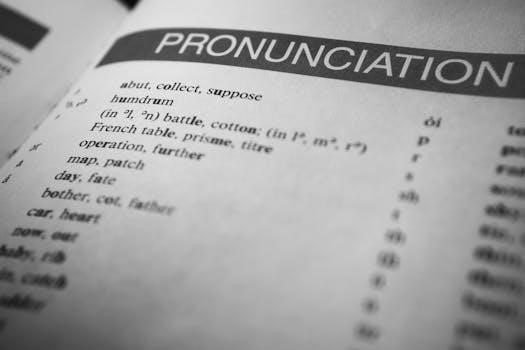AQA GCSE English Language Revision Guide
Welcome to your comprehensive guide for conquering the AQA GCSE English Language exam! This resource offers a structured approach to revision‚ covering key skills‚ grammar‚ and effective techniques for success․ Get ready to excel!
Overview of the AQA GCSE English Language (8700)
The AQA GCSE English Language (8700) is designed to assess your reading and writing abilities․ It focuses on your capacity to understand and analyze diverse texts‚ alongside your skills in crafting creative and persuasive pieces․ The qualification comprises two papers‚ each carrying equal weighting in the final grade․
Paper 1‚ “Explorations in Creative Reading and Writing‚” challenges you to respond to unseen extracts and produce your own narrative or descriptive writing․ Paper 2‚ “Writers’ Viewpoints and Perspectives‚” requires comparative analysis of non-fiction texts and the ability to present a well-reasoned argument․ Success hinges on a strong grasp of literary techniques‚ grammatical accuracy‚ and effective communication skills․
This course emphasizes critical thinking‚ textual interpretation‚ and articulate expression‚ equipping you with valuable skills applicable beyond the classroom․ Embrace the challenges and unlock your potential in language and communication!
Paper 1⁚ Explorations in Creative Reading and Writing
AQA GCSE English Language Paper 1 invites you to immerse yourself in the world of creative reading and writing․ This paper assesses your ability to comprehend and analyze unseen literary texts‚ ranging from extracts of novels to short stories․ You will be required to demonstrate your understanding of language‚ structure‚ and form‚ exploring how writers craft meaning and engage their readers․
The writing section of Paper 1 presents an opportunity to showcase your own creative flair․ You’ll be tasked with producing a piece of descriptive or narrative writing‚ drawing on your imagination and language skills to create vivid imagery and compelling stories․ Effective planning‚ skillful use of language techniques‚ and a strong sense of audience are crucial for success․
Prepare to explore the power of language and unleash your creative potential in this engaging and rewarding paper․
Paper 1 Structure and Content
AQA GCSE English Language Paper 1 is structured into two sections⁚ Reading and Writing‚ each contributing 50% to the overall grade․ The Reading section presents you with an unseen extract from a literary text․ You’ll answer a series of questions that test your comprehension‚ analysis of language and structure‚ and evaluation of the writer’s methods․
The Writing section requires you to produce a piece of creative writing‚ either descriptive or narrative․ You will be assessed on your content‚ organization‚ purpose‚ and technical accuracy․ The paper is designed to assess your ability to respond thoughtfully to a given prompt and create a compelling piece of writing․
Careful time management is essential to ensure you can complete both sections effectively․ Practice analyzing unseen texts and honing your creative writing skills to maximize your potential in this paper․
Paper 2⁚ Writers’ Viewpoints and Perspectives
AQA GCSE English Language Paper 2 focuses on how writers present viewpoints and perspectives․ Unlike Paper 1’s creative focus‚ Paper 2 centers on non-fiction texts․ You’ll engage with two unseen sources‚ often articles‚ essays‚ or opinion pieces‚ exploring different viewpoints on a shared theme․
Your task is to analyze how writers use language and structure to convey their perspectives and influence the reader․ You’ll compare and contrast these viewpoints‚ identifying similarities and differences in their arguments and methods․ Critical evaluation of the writers’ choices and their impact on the audience is crucial․
Furthermore‚ you will craft your own written response‚ typically an argument or viewpoint piece‚ demonstrating your ability to articulate a clear perspective while engaging with the ideas presented in the source texts․ Mastering analytical and persuasive writing skills is key to success in Paper 2․
Paper 2 Structure and Content
AQA GCSE English Language Paper 2 is structured around two non-fiction source texts centered on a common theme․ The paper begins with comprehension questions‚ testing your ability to understand explicit and implicit meanings within the texts․ These questions often assess your understanding of the writers’ viewpoints and purposes․
A key component is the comparative analysis question‚ requiring you to compare how the writers present their ideas and perspectives․ This involves analyzing language‚ structure‚ and tone to identify similarities and differences․ You’ll also evaluate the effectiveness of each writer’s approach in conveying their message to the intended audience․
The final section involves a writing task where you present your own viewpoint on a related topic․ This assesses your ability to construct a coherent argument‚ using persuasive language techniques and structural devices to support your claims․ Effective planning and clear articulation are essential for success in this section․

Key Skills for AQA English Language
Mastering key skills is crucial for AQA English Language success․ Focus on reading comprehension‚ analytical skills‚ and effective writing techniques to excel in both Paper 1 and Paper 2 exams․
Reading Skills⁚ Comprehension and Analysis
Developing strong reading skills is fundamental to success in the AQA GCSE English Language exam․ This involves more than just understanding the surface level meaning of a text; it requires the ability to delve deeper and analyze the writer’s techniques‚ intentions‚ and the overall impact of their work․
Comprehension is the foundation․ It’s about accurately grasping the information presented‚ including identifying the main ideas‚ supporting details‚ and the writer’s purpose․ Practice active reading strategies‚ such as highlighting key points and summarizing paragraphs‚ to improve your comprehension skills․
Analysis takes your understanding to the next level․ This involves examining how the writer uses language‚ structure‚ and form to create meaning and achieve a specific effect․ Look for patterns in the language chosen‚ identify literary devices like metaphors and similes‚ and consider how the text is organized․ Explore the connotations of words and how they contribute to the overall tone and atmosphere․
To enhance your analytical skills‚ consider the context in which the text was written․ Understanding the historical‚ social‚ and cultural background can provide valuable insights into the writer’s perspective and the themes they explore․ Ultimately‚ effective reading comprehension and analysis are essential tools for navigating the complexities of the AQA English Language exam․
Writing Skills⁚ Structure‚ Grammar‚ and Style
Mastering writing skills is crucial for achieving high marks in the AQA GCSE English Language exam․ Effective writing involves a combination of clear structure‚ accurate grammar‚ and a distinctive style that engages the reader․ A well-structured piece of writing presents ideas in a logical and coherent manner․
Begin with a clear introduction that outlines your main argument or purpose․ Develop your ideas in well-organized paragraphs‚ using topic sentences to guide the reader․ Ensure smooth transitions between paragraphs to maintain flow․ Finally‚ conclude with a strong summary that reinforces your key points․
Grammar provides the framework for clear communication․ Pay attention to subject-verb agreement‚ correct tense usage‚ and proper punctuation․ Avoid common grammatical errors that can detract from your writing․
Style refers to the way you express your ideas․ Use a varied vocabulary to add depth and interest to your writing․ Experiment with different sentence structures to create rhythm and emphasis․ Consider your audience and purpose when choosing your tone and voice․ Whether you are writing creatively or analytically‚ strive for clarity‚ precision‚ and originality in your style․ By focusing on structure‚ grammar‚ and style‚ you can elevate your writing and impress the examiners․

Grammar Revision for AQA English Language
Sharpen your grammar skills for the AQA English Language GCSE! Understanding grammar rules enhances clarity and precision in your writing‚ leading to improved communication and higher marks․
Understanding Grammar Rules
Mastering grammar is crucial for success in the AQA English Language GCSE․ Grammar provides the framework for clear and effective communication‚ enabling you to express your ideas with precision and impact․
Begin by revisiting the fundamental building blocks⁚ nouns‚ verbs‚ adjectives‚ adverbs‚ pronouns‚ prepositions‚ and conjunctions․ Understand their roles within a sentence and how they interact to create meaning․ Pay close attention to subject-verb agreement‚ ensuring that verbs correctly match their subjects in number․
Delve into the intricacies of tenses‚ mastering the correct usage of past‚ present‚ and future forms․ Recognize the nuances of perfect and continuous tenses to convey actions occurring over time․
Explore the world of punctuation‚ understanding the functions of commas‚ semicolons‚ colons‚ apostrophes‚ and quotation marks․ Learn how to use punctuation to clarify meaning‚ separate clauses‚ and indicate pauses․
Finally‚ practice identifying and correcting common grammatical errors‚ such as misplaced modifiers‚ dangling participles‚ and pronoun disagreements․ Regular practice will solidify your understanding and improve your accuracy․
Improving Clarity and Meaning
Enhancing clarity and meaning in your writing is paramount for achieving top marks in the AQA English Language GCSE․ Clear and concise writing ensures your ideas are easily understood‚ while strong meaning captivates the reader and leaves a lasting impression․
Begin by focusing on sentence structure․ Avoid overly long and complex sentences that can confuse the reader․ Instead‚ aim for a mix of short‚ punchy sentences and longer‚ more descriptive ones․ Use active voice whenever possible to make your writing more direct and engaging․
Choose your words carefully․ Opt for precise and specific vocabulary that accurately conveys your intended meaning․ Avoid vague or ambiguous language that can lead to misinterpretations․ Use a thesaurus to expand your word choices and find more impactful alternatives․
Pay attention to the flow of your writing․ Use transitional words and phrases to connect ideas and create a smooth‚ logical progression․ Ensure each paragraph has a clear topic sentence that introduces the main idea․
Finally‚ proofread your work meticulously․ Look for any errors in grammar‚ spelling‚ or punctuation that could detract from the clarity and meaning of your writing․

Revision Resources and Techniques
Maximize your AQA English Language revision with targeted resources! Utilize past papers‚ revision guides‚ and online tools to solidify your understanding and refine your exam technique for optimal performance․
Past Papers and Sample Questions
One of the most effective revision techniques involves immersing yourself in past papers․ Accessing and working through official AQA GCSE English Language past papers provides invaluable experience with the exam’s format‚ question types‚ and time constraints․ Download recent papers to familiarize yourself with the structure of both Paper 1 and Paper 2․

Alongside past papers‚ sample questions offer a targeted approach to specific skills․ These resources help you hone your comprehension‚ analysis‚ and writing abilities․ Use them to identify areas where you need further practice․ Focus on understanding the mark schemes to grasp the examiners’ expectations and learn how to maximize your marks․
By diligently working through past papers and sample questions‚ you’ll build confidence‚ improve your timing‚ and develop a deeper understanding of the AQA GCSE English Language curriculum․ Remember to review your answers thoroughly‚ identifying areas for improvement and seeking feedback from teachers or peers․
Revision Guides and Workbooks
Revision guides and workbooks are invaluable tools for structured learning and targeted practice in your AQA GCSE English Language preparation․ A high-quality revision guide offers a comprehensive overview of the entire curriculum‚ breaking down complex concepts into manageable chunks․ Look for guides that clearly explain reading and writing skills‚ grammar rules‚ and exam techniques․
Workbooks provide opportunities for active learning through exercises and practice questions․ They allow you to apply your knowledge and reinforce your understanding of key topics․ Choose workbooks that align with the AQA specification and offer a variety of question types‚ including those found in the actual exams․
When using revision guides and workbooks‚ focus on understanding the underlying principles rather than simply memorizing facts․ Work through the exercises systematically‚ identifying areas where you need further support․ Supplement your learning with online resources and seek guidance from teachers or tutors when necessary․ Remember‚ consistent and focused practice is key to success․
Online Quizzes and Interactive Tools
Online quizzes and interactive tools are fantastic resources for engaging and effective AQA GCSE English Language revision․ These platforms offer a dynamic way to test your knowledge‚ identify areas for improvement‚ and make learning more enjoyable․ Look for quizzes that cover a range of topics‚ including reading comprehension‚ writing skills‚ and grammar․
Interactive tools‚ such as vocabulary builders and grammar exercises‚ can help you strengthen your understanding of key concepts․ Many websites offer instant feedback‚ allowing you to track your progress and pinpoint areas where you need additional support․ These resources can also provide personalized learning experiences‚ adapting to your individual needs and learning style․
When using online quizzes and interactive tools‚ be sure to choose reputable sources that align with the AQA specification․ Set realistic goals and track your scores to monitor your improvement over time․ Remember to balance your online learning with other revision methods‚ such as reading textbooks and completing practice papers․ By incorporating online quizzes and interactive tools into your revision routine‚ you can enhance your learning and boost your confidence for the AQA GCSE English Language exam․

No Responses